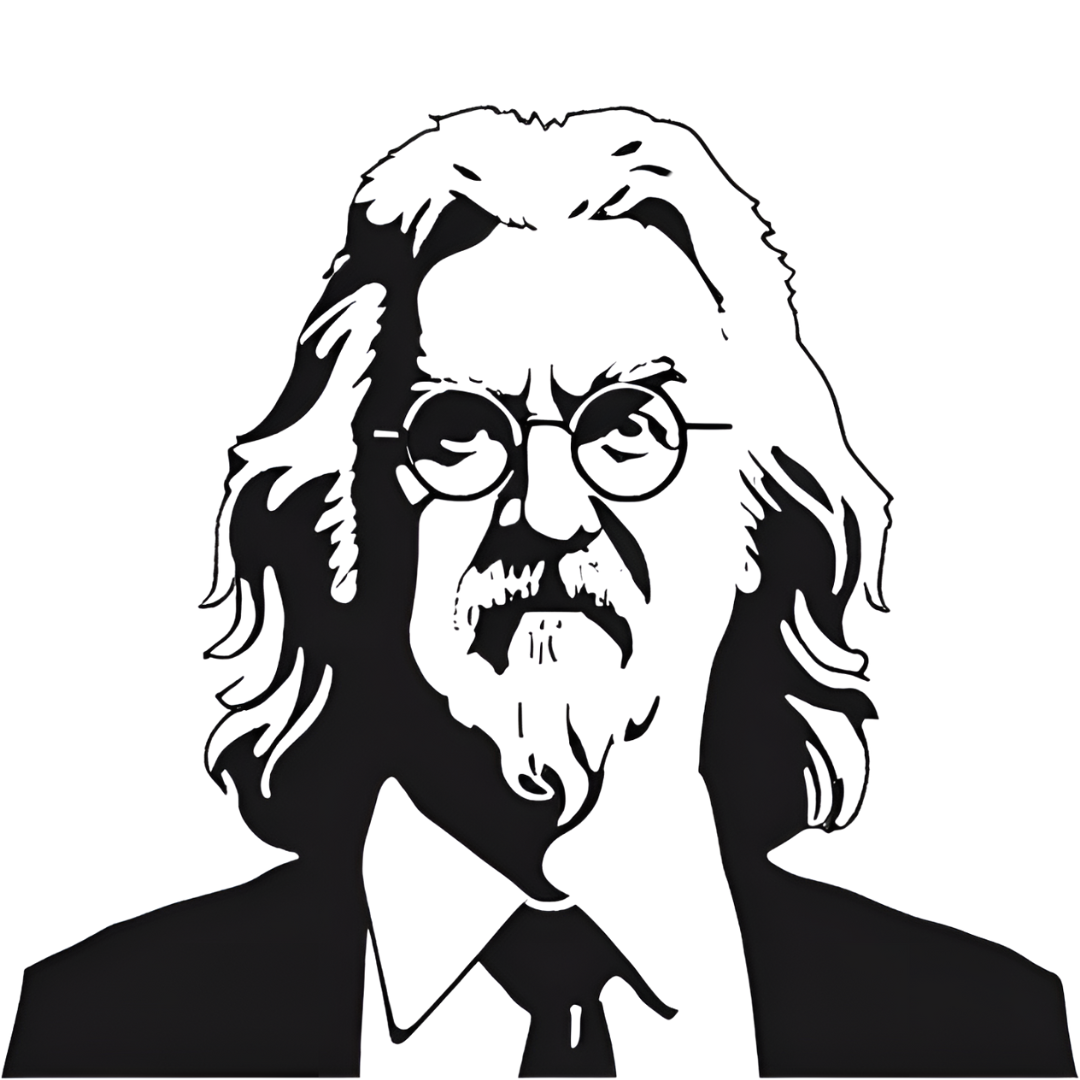Early Life and Background
Billy Connolly was born on November 24, 1942, in Glasgow, Scotland. His early life was marked by hardship; his father was in the military, and his mother left the family when Billy was young. Raised by his aunts in a working-class area of Glasgow, Connolly faced a difficult childhood, but he found solace in humour, which became his way of coping with adversity.
Connolly left school at 15 and took an apprenticeship as a welder in a shipyard, an experience that heavily influenced his comedy. He began performing music during this time, playing the banjo and becoming part of the local folk music scene.
Transition from Music to Comedy
Connolly started his entertainment career as a musician, playing in the folk band The Humblebums alongside fellow Scottish musician Gerry Rafferty. The band enjoyed moderate success in the late 1960s, releasing several albums. However, it was during his time with The Humblebums that Connolly’s comedic talent began to emerge, as he would often entertain audiences between songs with humorous monologues.
After the band split, Connolly decided to pursue stand-up comedy full-time in the early 1970s. His big break came in 1975 when he appeared on the British television show Parkinson. Connolly’s irreverent, earthy humour and masterful storytelling captivated the audience, and his career as a comedian skyrocketed from there.
Comedy Career and Style
Billy Connolly’s comedic style is characterized by his observational humour, personal anecdotes, and natural storytelling ability. He often riffs on everyday situations, social issues, and human nature, weaving his experiences into long, humorous narratives. His distinctive Scottish accent and often profane language have become signature elements of his performance, though it’s his wit and warmth that resonate most with audiences.
In the 1970s and 1980s, Connolly became a fixture on British television, appearing in numerous comedy specials and talk shows. His stage performances were known for their spontaneous nature, often veering off-script and engaging directly with the audience. Connolly’s comedy transcended traditional punchlines, relying instead on detailed, often hilarious stories that could span several minutes.
Acting Career
Connolly’s success in comedy led to a prolific acting career. He made his film debut in the 1978 comedy Absolution and went on to star in a variety of films and television series. Some of his notable roles include:
- “Mrs. Brown” (1997): Connolly starred opposite Judi Dench in this historical drama about the relationship between Queen Victoria and her servant John Brown. His performance as Brown earned him a BAFTA nomination and showed his capability as a serious actor.
- “The Boondock Saints” (1999): In this cult-classic action film, Connolly played Il Duce, a hitman and the father of the vigilante protagonists. His intense and somewhat comedic portrayal became one of the film’s highlights.
- “The Last Samurai” (2003): Connolly appeared alongside Tom Cruise in this historical epic, playing Sergeant Zebulon Gant. His role, though small, added gravitas and humour to the film.
Connolly has also voiced characters in animated films, such as Brave (2012), where he provided the voice for King Fergus, bringing his distinctive personality to a global audience.
Personal Life and Health
Billy Connolly has been married twice and has five children. He has been married to his second wife, Pamela Stephenson, since 1989. Stephenson is a psychologist and writer, and in 2001, she published a biography of Connolly titled Billy, which became a bestseller.
In 2013, Connolly revealed that he had been diagnosed with Parkinson’s disease. Despite the illness, he continued performing until his retirement from live comedy in 2020, when he announced that he would no longer tour due to the progression of the disease. Connolly has spoken openly about living with Parkinson’s, using his platform to raise awareness about the condition. Though no longer performing stand-up, he continues to work on various creative projects, including writing, drawing, and painting.
Artistic Pursuits
In addition to comedy and acting, Connolly has pursued a passion for visual art, particularly drawing and painting. His artwork, which often reflects his humour and worldview, has been exhibited in galleries and enjoyed commercial success. Connolly’s work as an artist showcases his creativity beyond the stage, and he has said that painting gives him a sense of peace and fulfilment.
Honours and Legacy
Billy Connolly’s contributions to comedy and entertainment have earned him numerous accolades and honours. In 2003, he was awarded a CBE (Commander of the Order of the British Empire) for his services to entertainment. In 2017, he received a knighthood, becoming Sir Billy Connolly in recognition of his impact on British and Scottish culture.
Connolly’s influence on the world of stand-up comedy is immeasurable. He is credited with helping shape modern British comedy, moving away from the traditional joke-based format to more narrative-driven, personal humour. His comedy is often described as inclusive and heartfelt, despite its often brash and irreverent tone.
Summary
Billy Connolly is a beloved figure in the world of comedy and entertainment, known for his sharp wit, unique storytelling, and ability to connect with audiences across the globe. His career has spanned music, comedy, acting, and art, making him one of Scotland’s most iconic cultural figures. Despite his battle with Parkinson’s disease, Connolly remains a symbol of resilience, humor, and creativity, and his legacy as one of the greatest comedians of all time is firmly secured.


